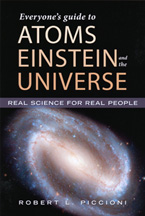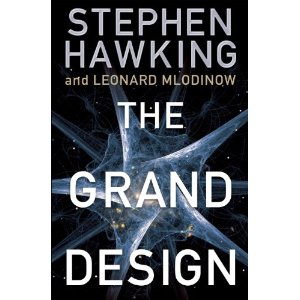A fortnight ago I attended a lecture by Robert Piccioni. Rarely have I heard Einstein’s work and the fundamentals of modern cosmology explained in such a simple, entertaining and yet informative way. Much of the lecture’s content is echoed in Piccioni’s latest book, which I highly recommend for everyone.
Learn the basics about how the universe works and understand the difference between Newton’s and Einstein’s view of gravity. Take a brief look at phenomena such as black holes, dark energy, gravitational lensing, redshift and the expanding universe! Piccioni’s work is a perfect blend of hard science and amusing anecdotes, making it very easy to follow. No advanced background in science is needed.
Everyone’s guide to Atoms, Einstein and the Universe, by Robert L. Piccioni (2nd Edition). ISBN 13: 978-0-9822780-7-9.
Talking about books: The Grand Design, the most recent book by Stephen Hawking (this time co-authored Leonard Mlodinow) just came out. (ISBN-13: 978-0553805376)
The wheelchair bound physicist from Britain is arguably the most famous scientist since Einstein. At his last lectures here at Caltech, people were lining up all night for a spot in the lecture hall. (It is amusing to see that even in this day and age, scientists can achieve rock-star fame).
Immediately after the The Grand Design appeared earlier this month, some began to misquote it, saying Hawkins claimed that there was no God. But that’s not what Hawkins & Mlodinow are saying.
If we accept that nature is governed by laws, logical questions arise: What is the nature of these laws? Are there exceptions to them (the so-called “miracles”)? Is there really only one set of laws?
Ever since the beginning of mankind’s inquiry, there were those who accused “scientists“ (as the believers in “natural philosophy” began to be called in the 19th century) of plunging the world into moral and ethical darkness, as theirs was allegedly an attempt to demystify or even deny God’s involvement in nature.
Even this is a misunderstanding. Descartes, Galilei, Copernicus, Newton, Darwin and the like maintained their belief in a supreme being, while at the same time carrying on their investigations into the principles and laws governing everything in the universe.
Hawkins & Mlodinow contend that modern science has reached the point where the “mysterious hand of God” is perceivably no longer necessary to “explain” how the universe functions. Rather, our level of understanding of natural laws may have progressed to the point where we can (or will soon be) able to explain all the fundamental milestones of cosmology with pure reason.
The intellectual methods used in today’s science are in effect no different to those used by Aristarchus of Samos (310 BC – 230 BC, approx.) who, during the Ionian period, correctly calculated that the Earth orbits the Sun. Furthermore, that the Sun must be bigger than the Earth, which was not the center of the universe. (Of course, it took more than 1800 years until the heliocentric world view would become universally accepted). Here too, an “explanation” such as “God made it” is not sufficient, and neither is:
The sun is a luminary whose egress is an opening of heaven, which is (located) in the direction of the east, and whose ingress is (another) opening of heaven, (located) in the west. I saw six openings through which the sun rises and six openings through which it sets. The moon also rises and sets through the same openings, and they are guided by the stars; together with those whom they lead, they are six in the east and six in the west heaven. All of them (are arranged) one after another in a constant order. There are many windows (both) to the right and the left of these openings. First there goes out the great light whose name is the sun; its roundness is like the roundness of the sky; and it is totally filled with light and heat. The chariot in which it ascends is (driven by) the blowing wind. The sun sets in the sky (in the west) and returns by the northeast in order to go to the east; it is guided so that it shall reach the eastern gate and shine in the face of the sky. (1 Enoch 72:2–5)
And yet, science has never ruled out the possible existence of a supreme being, which may well lie beyond the abilities of our intellect, in the same manner as quantum physics is beyond what a chimp can rationally comprehend.
In human terms, as Piccioni rightfully pointed out in his talk, we live in the “golden age” of Astronomy. There have been more groundbreaking discoveries about our universe within the last 100 years, than in all the history of mankind before.


